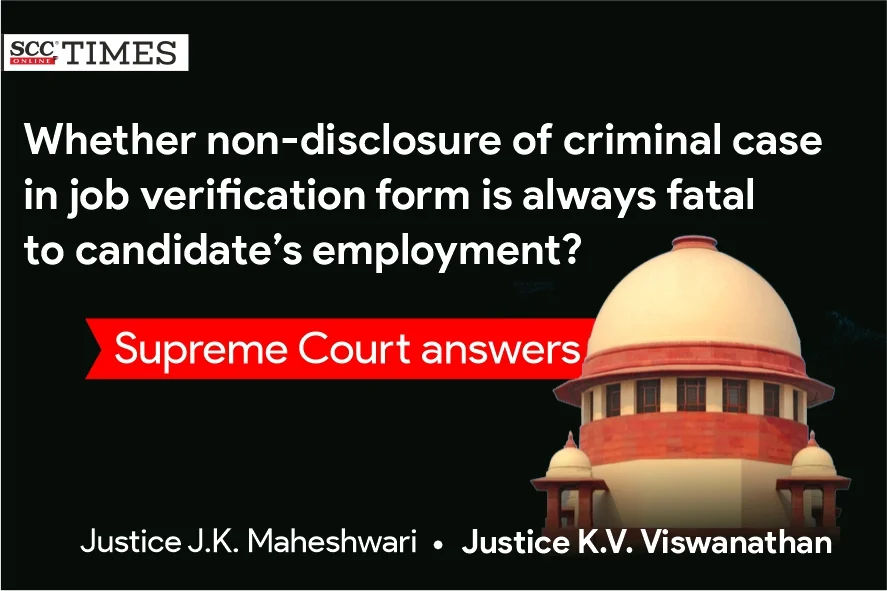Supreme Court: In a civil appeal against the Allahabad High Court’s decision, the Division Bench of J.K. Maheshwari and K.V. Viswanathan*, JJ. allowed the appeal and held that non-disclosure of the criminal case in the verification form, which ended in acquittal, is not always fatal to the candidate’s employment. The Court said that each case will depend on the facts and circumstances, and the Court will have to take a holistic view.
Factual Matrix
The appellant applied for the post of Constable. Five days after submitting the application, i.e. on 17-02-2004, he was involved in a criminal case for offences punishable under Sections 324, 352 and 504 of the Penal Code, 1860 (‘IPC’). The appellant had cleared the written exam and the interview. Subsequently, the appellant was acquitted vide judgment dated 13-09-2004. After the selection, the appellant submitted an affidavit on 30-10-2004, wherein, he inter alia, stated that no criminal case, cognizable or non-cognizable, has ever been registered against him.
On 12-04-2005, the appellant’s selection for the post of Constable was cancelled for producing a false affidavit. The respondent-Department’s case was that, under Clause 9 of the recruitment notification dated 20-01-2004, if any fact is concealed in the affidavit by the candidate, his candidature is liable to be cancelled.
The Allahabad High Court dismissed the appellant’s petition challenging the letter dated 12-04-2024 and held that the appellant suppressed material information about his involvement in a criminal case at the time of filling up the form. Further, it was held that the subsequent acquittal in the criminal case will not absolve him from the fact that he had suppressed material information. In the appeal, the Division Bench dismissed the Special Appeal holding that if a person swears a false affidavit at the time of enrollment, he is not fit to be enrolled in the disciplined service.
Issue
Is it a cut and dried rule that, in all circumstances, non-disclosure of a criminal case in which the candidate was acquitted in the verification form is fatal for the candidate’s employment?
Analysis and Decision
The Court referred to Avtar Singh v. Union of India (2016) 8 SCC 471, wherein it was said that though a person who has suppressed the material information cannot claim unfettered right for appointment or continuity in service but he has a right not to be dealt with arbitrarily and exercise of power has to be in reasonable manner with objectivity having due regard to facts of cases.
The Court also referred to Ram Kumar v. State of U.P. (2011) 14 SCC 709, wherein the Court directed that a constable whose selection was cancelled was to be taken back into service.
The Court stated that the nature of the office, the timing and nature of the criminal case; the overall consideration of the judgement of acquittal; the nature of the query in the application/verification form; the contents of the character verification reports; the socio- economic strata of the individual applying; the other antecedents of the candidate; the nature of consideration and the contents of the cancellation/termination order are some of the crucial aspects which should be there in the judicial verdict in adjudging suitability and in determining the nature of the relief to be ordered.
The Court noted that on the date of application, no criminal case was pending and there was no suppression in the application form. The Court also noted that the police verification report stated that his character was good and that no complaints were found against him and that his general reputation was good. Further, the Court noted that the SHO had certified the character of the candidate as excellent and that he was eligible to do Government Service under the State Government.
The Court said that letter dated 12-04-2005 did not even follow the mandate prescribed in Clause 4 of the Form of verification of character which requires the appointing authority to satisfy itself that the character of a candidate for direct appointment must be such as to render him suitable in all respects for employment in the service or post to which he is to be appointed.
Placing its reliance upon Satish Chandra Yadav v. Union of India, (2023) 7 SCC 536, whereby it was set out that each case should be scrutinized thoroughly by the public employer concerned and the Court is obliged to examine whether the procedure of enquiry adopted by the authority concerned was fair and reasonable, the Court held that the letter dated 12-04-2005 was neither fair nor reasonable. In the present case, the Court opined that non-disclosure of the criminal case in which the appellant was acquitted, it cannot be deemed fatal for the appellant. Further, the Court said that broad brushing every non-disclosure as a disqualification will be unjust, each case will depend on the facts and circumstances, and the Court will have to take a holistic view.
Thus, the Court allowed the appeal and set aside the impugned order. The Court also quashed the respondent-Department’s letter dated 12-04-2005, as to cancelling the appellant’s selection. The respondent-Department was directed to appoint the appellant to the post of Constable for which he was selected. The Court clarified that the appellant was not entitled to the arrears of salary for the period during which he did not serve the force. Further, the Court directed that the appellant will be entitled for all notional benefits, including pay, seniority and other consequential benefits.
[Ravindra Kumar v. State of U.P., 2024 SCC OnLine SC 180, Decided on: 22-02-2024]
*Judgment Authored by: Justice K.V. Viswanathan
Know Thy Newly Appointed Supreme Court Judge: Justice K.V. Viswanathan








